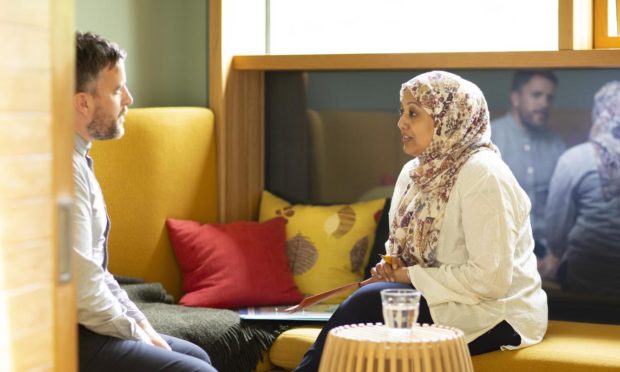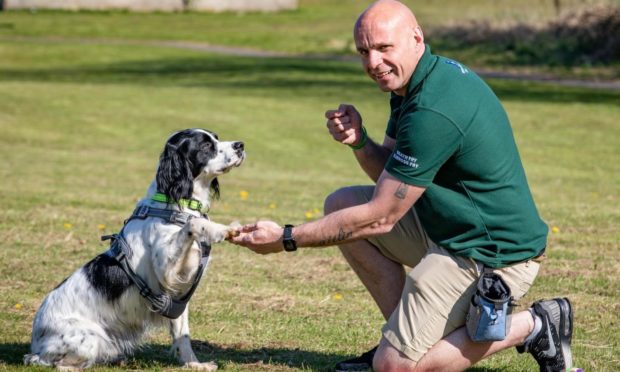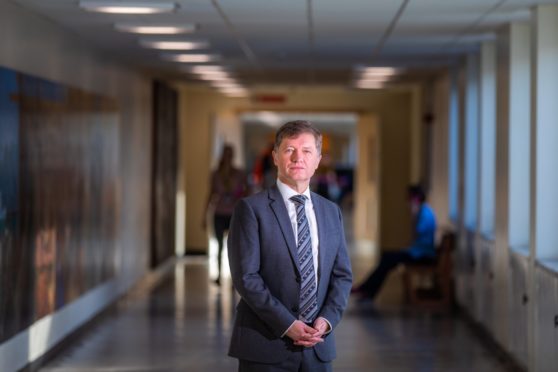The last year has been challenging for everyone, but for many who have spent it shielding, the prospect of returning to normal life doesn’t hold the same excitement as it does for many others.

In March, the Scottish Government announced that as of today (April 26), people who have been shielding can return to work, school, college and university: The beginning of a long road for many to leave their comfort zones and prepare for the reality of re-entering society once again.
For many shielders, it’s not as easy as flicking a switch and immediately returning to normality.
A recent survey reported a third of shielders had experienced high levels of mental distress, compared to around a fifth (21%) of the population as a whole.
Malita Kilgour from Dundee has been shielding for more than a year, following the removal of her spleen which lowered her immune system.
Malita explains: “I can sum it up by saying I’ve felt quite trapped and isolated for over a year now. That’s been a year from my life and I don’t know how long that life is going to be.
“Of course, nobody knows how long their life will be, but when you’ve had a bit of a heads up and then you’re denied a year, that’s pretty hard to take.”
Coping with isolation
Approximately 180,000 people in Scotland have been advised to shield since the start of the pandemic, due to age or a pre-existing health condition that makes them particularly vulnerable to coronavirus.
Many haven’t seen friends or family, or left their homes in over a year, even when the restrictions were eased over the summer.
Malita continues: “I have had to isolate myself from those that I love because I’ve had to keep myself safe and that’s really difficult.
“I’m relieved because there’s going to be a ‘new normal’, whatever that will be. I feel relief that we can actually meet up with other people.
“But I think what everyone has to realise is that for those who have been shielding to protect themselves, you can’t just push a switch and everything is OK.
“How do you maintain friendships and closeness with loved ones when at the back of your mind you’re still wondering if they’ve kept safe before coming to your house? That’s quite hard.”
For many shielders, charity support has been a lifeline: Zoom sessions run by cancer charity Maggie’s were a “lifesaver” for Malita.
“Having that contact with Maggie’s over Zoom was amazing. They made the best of the situation and they continued to make the best of it.
“As far as my mental health and coping with isolation, being able to speak to Maggie’s once or twice a week was unbelievably helpful.”
Karen Mackinnon, Centre Head for Maggie’s Dundee, says: “We’re here for people who wish to come out of shielding more slowly, by offering online and telephone support to run in alongside our face-to face support as we return to a new sense of normality.
“In 2020 Maggie’s supported people 239,000 times and we know that as the full impact of coronavirus on people with cancer becomes clearer, our support will be needed more than ever in coming months.”
Returning to work
For some shielders returning to work, today is the first opportunity to return to normal life: 68% of shielders who worked prior to the pandemic say they are comfortable going back to work outside the home if protective measures are in place.
For others, it is a tough decision between personal safety, ensuring their health is well-protected, and the need to earn money.
For Malita, the choice is simple.
She explains: “I’m not going back to work, thankfully. I think that would be an absolute nightmare. It’s just another minefield for people going back to work.
“On top of everything else you have to navigate that conversation with your employer, and navigate it in a way that you don’t want to feel that you’re paranoid.
“But some people that have been shielding have to be paranoid. You have to think that everyone you’re coming into contact with could have Covid-19 and you have to think like that to keep yourself safe.
“Employers have to listen to the fears and concerns somebody has as they’re coming out of shielding. They have to have that conversation and encourage the person coming out of shielding to talk about their concerns.”
‘Tell people how you feel’
Latest figures suggest that 72% of those shielding in Scotland have reported it has had a negative impact on their mental health, with those in socio-economically vulnerable groups worse affected.
Malita urges: “Tell people how you feel. You have to be honest and have that conversation.
“Others need to understand that when you’ve been shut off from the world, you can’t just change that on April 26 because the government says the lockdown is eased. That feeling is not going to just go away.”
The last year has been difficult for us all. We are here with you 🧡
Give us a ring on 01382 632 999 if you need a chat or visit https://t.co/d94EsUYNWa for support.#NationalDayofReflection pic.twitter.com/xSUhjMEub3
— Maggie's Dundee (@maggiesdundee) March 23, 2021
Though there are still challenges as we begin to navigate out of lockdown, the future is looking bright once again.
Malita concludes: “What I’m looking forward to the most is having hugs. And being able to sit down and have a meal with people, instead of eating alone.
“People just want the simple things to return to normal. That’s what I’m looking forward to more than ever: Doing the simple, normal things in a safe way.”













